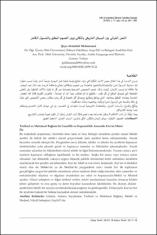| dc.contributor.author | Muhammed, Qays Abdullah | |
| dc.date.accessioned | 2019-11-15T07:05:53Z | |
| dc.date.available | 2019-11-15T07:05:53Z | |
| dc.date.issued | 2018 | en_US |
| dc.identifier.citation | Mohammaed, Q. A. (2018). النص القراني بين السياق التارخي والمكاني و بين العموم المطلق والشمول الكامل. Hitit Üniversitesi İlahiyat Fakültesi Dergisi, 17(34), 461-480. | en_US |
| dc.identifier.uri | https://doi.org/10.14395/hititilahiyat.466769 | |
| dc.identifier.uri | https://hdl.handle.net/11491/5329 | |
| dc.description.abstract | يَدْرسُ الباحثُ في هذا المقالِ بعضَ الآياتِ المَكّيّةِ التي نزلتْ تعالجُ وَضْعا مُعَيّنا قبل الهجرة، وأيضاً آياتٍ نزلتْ لسبب مُعَيَّن؛ ثمَّ اسْتنبطَ الرسولُ (ص) والصَّحابةُ والتابعونَ والعلماءُ مِن عُمومها وإطْلاقِها مَعانيَ وأحكاماً شُرِعتْ بعد ذلك بعد الهِجْرةِ، ولا عَلاقة لها بِسبب النزولِ؛ لِيُثبتَ بِذلك عُموم النصوصِ الشرعيةِ وتجردَها عن كُلّ ما يُقيّدُ دلالاتِ ألفاظِها على المعاني المختلفةِ التي تُصدِّقُ الواقعَ في كُلّ وقت - بالطَبعِ ما لم تُخالِف نصاً آخر أو إجماعاً -. فالقرآن الكريمُ كلامُ اللهِ المعجزُ، المحدودُ بِعباراته المطلقُ بِمعانيهِ، الذي يوافقُ ويطابِقُ ويصدّقُ كُلّ حَقيقةٍ في كُلّ زمان ومكان، بِنفسِ النُّصوصِ التي نزلتْ في مكة والمدينة على الرسول (ص) وارتَقَتْ بِواقعِهِما وحلَّتْ مشاكلَهما....
والمَكيُّ والمدنيُّ، وأسبابُ النزولِ، والمتعلقاتُ التاريخيةُ ليستْ مُقيِّداتٍ في التفسير؛ بلْ هي عواملُ لإثراءِ التفسير وإعطائهِ بُعْداً وعُمْقاً اكثرَ وأكبرَ.
وهذا يُؤكّدُ أنَّ آياتِ الأحكامِ لا يمكنُ تحْديدُها بِعددٍ مُعينٍ فكلُّ آياتِ القرآن يُمكنُ أنْ تكونَ مَعِيناً وَمَصْدرا للتشريعِ. | en_US |
| dc.description.abstract | Bu makalede araştırmacı, hicretten önce inen ve bazı belirgin sorunlara çözüm sunan Mekkî ayetler ile belirli bir sebeb-i nüzul çerçevesinde inen ayetleri konu edinmektedir. Ancak hicretten sonraki süreçte Hz. Peygamber (sav), Sahabe, tabiûn ve alimler bu ayetlerin kapsayıcı ifadelerinden yola çıkarak genel ve kapsayıcı manalar ve hükümler çıkarmışlardır. Ancak sonradan çıkarılan bu hükümlerin nüzul sebebi ile ilgisi bulunmamaktadır. Yazarın amacı, şer’i nasların kapsayıcı olduğunu ispatlamak ve bu nasları, -başka bir nassa veya icmaya aykırı olmadan- her dönemde vakıaya uygun düşecek şekilde lafızlarının farklı anlamlara delaletini sınırlayacak her şeyden soyutlamaktır. Kur’an Allah'ın mu’cizevi kelamıdır. Kur’an’ın ifadeleri sınırlı olsa da Mekke’de ya da Medine’de peygambere (sav) inerek her iki toplumun gerçekliğine uygun bir şekilde sorunlarını çözen nasların ifade ettiği manalar, tüm zamanlar ve mekânlardaki olaylara ve olgulara mutabakat arz edici ve kapsayıcıdır. Mekkî ve Medenî ayetler, Nüzul sebepleri ve diğer tarihsel veriler, tefsiri sınırlandıran hususlar olmayıp bilakis tefsiri geliştiren ve ona geniş ve derin boyutlar kazandıran faktörlerdir. Bu durum ahkam ayetlerinin belirli bir sayıyla sınırlandırılamayacağının da göstergesidir. Dolayısıyla Kur’an her bir ayetinin hukuki bir hükme kaynaklık etmesi mümkündür. | en_US |
| dc.description.abstract | In this article, author studies the Mekkah verses which provide solutions to some distinct problems and the verses which revealed for various specific occasions. The Prophet Muhammad, the companions of him, the successors of the companions and Muslim scholars adjudge based on those verses. But those verdicts have nothing to do with the verse’s occasions of revelation. The aim of article is to demonstrate the inclusiveness of canon laws and to isolate them –without contradiction with each other- from being corresponded with the issues at any time. The Quran is the miracle words of Allah. Despite the fact that the expressions of the Qur’an are limited, due to fact that the Mekkah and Medinah verses provide solutions in accordance with the conditions of Mekkah and Medinah society, the meanings of them are valid for all times. The occasions of revelation of Mekkah and Medinah verses do not restrict the interpretation but they are the factors which develop the interpretation and bring them broad and deep dimensions. This point shows that the judicial verses could not be restricted with specific number. Hence each verses of Qur’an can be a resource of a judgement. | en_US |
| dc.language.iso | ara | en_US |
| dc.publisher | Hitit Üniversitesi | en_US |
| dc.relation.isversionof | 10.14395/hititilahiyat.466769 | en_US |
| dc.rights | info:eu-repo/semantics/openAccess | en_US |
| dc.subject | الاعجاز الغني | en_US |
| dc.subject | اسباب النزول | en_US |
| dc.subject | المكي والمدني | en_US |
| dc.subject | سياق الزمان والمكان | en_US |
| dc.subject | التجرد | en_US |
| dc.subject | Umûm | en_US |
| dc.subject | Mekkî ve Medenî | en_US |
| dc.subject | Anlamı Soyutlama | en_US |
| dc.subject | Tarihsel ve Mekânsal Bağlam | en_US |
| dc.subject | Nüzûl Sebepleri | en_US |
| dc.subject | General | en_US |
| dc.subject | Purification of Meaning | en_US |
| dc.subject | Historical and Spatial Context | en_US |
| dc.subject | Mekkah and Medinah | en_US |
| dc.subject | The Occasions of Revelation | en_US |
| dc.subject | The Unseen Miraculousness | en_US |
| dc.title | النص القراني بين السياق التارخي والمكاني و بين العموم المطلق والشمول الكامل | en_US |
| dc.title.alternative | Tarihsel ve mekânsal bağlam ile genellik ve kapsamlılık arasında Kur'an metni | en_US |
| dc.title.alternative | The Qur’an between historical-spatial context and generality- extensity | en_US |
| dc.type | article | en_US |
| dc.relation.journal | Hitit Üniversitesi İlahiyat Fakültesi Dergisi | en_US |
| dc.department | Hitit Üniversitesi, İlahiyat Fakültesi, Temel İslam Bilimleri Bölümü | en_US |
| dc.identifier.volume | 17 | en_US |
| dc.identifier.issue | 34 | en_US |
| dc.identifier.startpage | 461 | en_US |
| dc.identifier.endpage | 480 | en_US |
| dc.relation.publicationcategory | Makale - Ulusal Hakemli Dergi - Kurum Öğretim Elemanı | en_US |


















